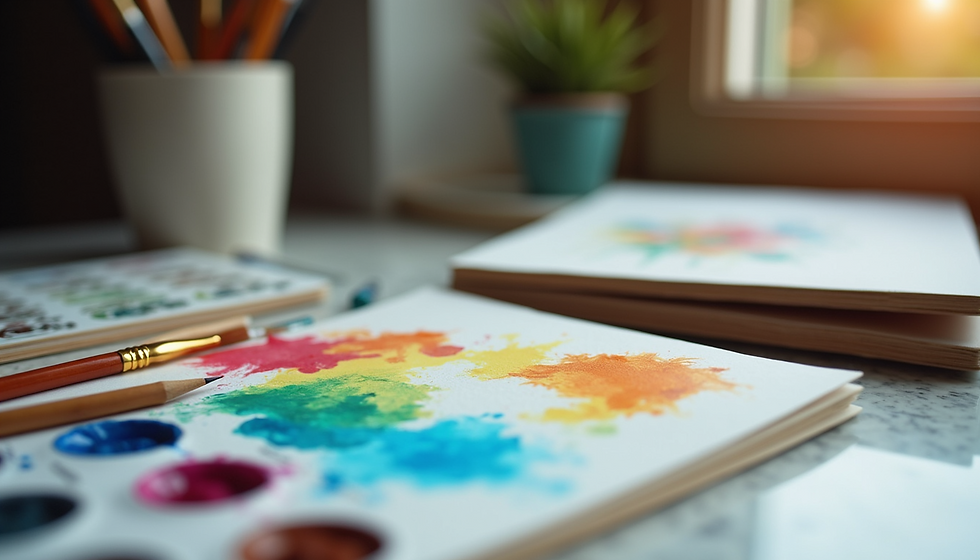Getting deeper...
- cygnini_creative

- May 23, 2021
- 3 min read

Photo by Dragos Gontariu on Unsplash
For the past couple of weeks I have been delving deeper into understanding more about creativity, despite this being something I started learning about during my teaching degree, 20 years ago. I say "started" because there is always more to learn and in that time more has changed, or not.
It is something I am passionate about, but over the years of teaching the fire was dulled and every creative learning experience I wanted to offer came up against the testing and assessment regimes that hover over schools like the large grey cloud that is heading towards my home as I sit here writing...

BUT, the embers were never completely
extinguished and the tiniest sparks kept trying to catch again and again.
Photo by David Schultz on Unsplash
Years later, having left full-time teaching, I sit as an outsider on the inside. A part-time independent support teacher with access to classrooms and a different view. Not caught up in part of the picture, but rather looking at a whole. I see different environments. I see different approaches. I don't see change. But I do still see children from the age of 5 sitting down being assessed (tested) to see what they know about English and Maths. Does that sound ok to you? Obviously it's not the fault of the school, it's a complete lack of understanding by those in control of how the world has changed and education needs to respond. A lack of creativity (or at the very least an opportunity to hone creative abilities) will impact us all.

Look around you...
Where would we be without the chairs we sit on, the cars we drive, the music we listen to? What would life be like without the innovations in technology that have appeared in a relatively short time? Where would we be without Google??!! - Google processes over 3.5 billion searches per day (Internetlivestats, 2019).
Photo by Edho Pratama on Unsplash
Everything around us is created for us - by designers, engineers, crafts people and more. Creatives. Imagine a world without art. I'm not only talking about the Old Masters, Damien Hurst and David Hockney, but what about the art on book covers, magazines, packaging?
We'd literally be lost without map makers (or the scientific engineers who put GPS into space!)!

Our lives are filled with objects that started life in someone's creative mind. So why is it that governments (not just here in the UK) think that the academic subjects are more important than the Arts? More worthy of their funding.

Sir Ken Robinson, whose book "Out of our Minds" is what I am currently reading and whom I have had a great deal of respect for since watching his RSA Animate "Changing Education Paradigms" talk, has made so much sense to me. His book has extended my understanding of how education has stood still in many respects and even now, when the modern world is being consumed by technological advances (a creative development), we still rely on testing a child's "ability" with sit-down tests in which a score is given and a decision made which can affect their whole life - you're good enough or you're not (or worse still, you're "borderline" - whatever does that even mean??!). We think that to be good at anything, we need to be able to answer questions on Shakespeare and work out Quadratic equations - just think back to a time that you have ever used these again since your exam... I'm betting that 90+% of us have never needed this information. So does this make this more of an IQ test? And if it does, then how do you feel when you fail?

Ask yourself, what "ability" are we actually testing? Certainly not how a child can interpret music (I just watched "Rocketman" - yes, a bit behind, but wow! Elton's "ability" was stunning! Haven't seen it? Make sure to!), or channel that inner Isadora Duncan. Not how well they can code a program, or design a computer game. Not even their ability to design graphics, clothing or accurately portray their teacher (in a sketch, a limerick or a cartoon!).
Photo by Michał Parzuchowski on Unsplash
Everyone needs help to tap into their creative abilities if that is what they want. Not every child excels or even 'gets' maths, not every child needs to know algebraic formulae or even how to express themselves in a haiku. But every child needs to experience these things, so they can see if they actually do have a skill for these. And if they don't then who is going to show them something else? Who is going to say, "That's ok, why not try this..."? Something to spark that flame. Something more creative?
Join the discussion as we pull the ideas part. I'd love to know your thoughts and continue this next time.




Comments